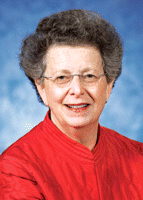Lifers Make Mentoring Key Part of Mission
Abstract
When Nada Stotland, M. D., M.P.H., joined the Lifers after decades of activity as an APA member and leader, she was invited to join one of the Lifers' committees. Stotland, who has served as a mentor to many psychiatrists throughout her career, wanted to continue with that tradition, so she established a mentoring committee within the Lifers and became its chair.

Nada Stotland, M.D., M.P.H.
"Mentoring is one activity that senior members certainly devote their time and considerable capabilities toward," Stotland told Psychiatric News. Stotland served as APA president from 2008 to 2009.
APA members are eligible to join the Lifers once they achieve the status of life member, life fellow, or distinguished life fellow. Currently, there are about 4,000 APA members who have achieved this status, and approximately 90 of them have joined the Lifers. The group maintains a caucus at the APA Assembly and holds a business meeting and reception each year at the annual meeting.
Lifers President Stephen Scheiber, M.D., noted that "there is much talent that can be tapped within our current members, and we suspect the greatest impact would be with early career psychiatrists."
In addition, he said that Lifers offering mentoring services may be of benefit to senior APA members grappling with retirement issues.
Once the Committee on Mentoring was established and its eight members were poised to offer their professional expertise to others, Stotland set about trying to determine how APA Lifers could best help the rest of the membership.
"I'd like to learn more from those eligible to be Lifers about what types of mentoring they are in a position to offer, and among the APA membership, what types of mentoring they would like to receive," Stotland commented.
She asked that APA members contact her at nadast{at}aol.com or APA staff member Linda Bueno at lbueno{at}psych.org.
"As Lifers, we are in a position to give back to our profession. Mentoring provides a good opportunity to stay active and involved and benefit others simultaneously," Stotland said.



